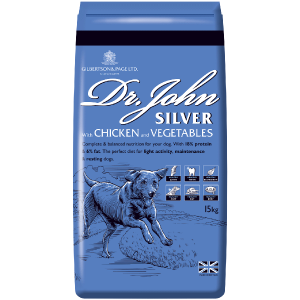5 Tips For Looking After Senior Dogs
24/01/2019
You’ve fed them, paid their vet’s bills, taken them for walks in all weathers and provided a cosy bed. In return, they’ve given you companionship and comfort. As your four-legged friend reaches their senior years, they  might need a little more tender loving care. Here are our five top tips for looking after senior dogs.
might need a little more tender loving care. Here are our five top tips for looking after senior dogs.
1. Regular check ups – Regular monitoring from you and your vet is a really good idea. Older dogs have a lower immunity, so catching health issues early gives them a better chance of fighting something off. As always, checking ears, eyes, nose and mouth is important. When you pat their side, make sure you can still feel their ribs. If you can’t, they may be gaining excess weight. Also keep an eye out for skin conditions, abnormal lumps and bumps, an upset stomach or anything else out of the ordinary.
2. Exercise – Your senior dog may be slowing down, but they still need some gentle exercise like short walks and opportunities to potter out and about. This will help to prevent extra weight gain, which would exacerbate conditions such as arthritis and hip dysplasia. Hip dysplasia is a genetic condition often common in older dogs, especially larger breeds. Senior dogs also need plenty of mental stimulation to keep them mentally active and interested in life so keep taking your dog out and about with you where possible, and continue playtime sessions with your dog although at a gentler pace.
3. Rest – And after the exercise, a good rest is in order. A comfortable bed in a quiet, cosy corner free from any draughts is just the ticket for a senior dog. Older dogs find it harder to cope with weather extremes, so need more help staying cool in summer and warm in winter. You may find that they need to wear a dog jacket to retain body heat in colder months. Furthermore, after wet walks or a swim, a rub down with a towel will prevent an older dog losing too much body heat.
4. Diet – Choosing a diet that specifically caters to them is a great way of looking after senior dogs. Whilst older dogs may not be as active as younger dogs, they do still require a nutritionally-balanced diet. Protein may not be helping them grow like a junior dog, but it is good for cell renewal. Fats and oils need to be slightly lower to avoid excessive weight gain, but they are still essential in the right forms to maintain the health of skin and coat, brain and joints. Diets like Dr John Silver Chicken with Vegetables are perfect for seniors. An easy-to-digest, lighter maintenance diet that contains 18% protein and 6% fats and oils as well as a bone and joint complex will suit most seniors. Older dogs sometimes lose their appetite a little or have trouble eating if they lose some teeth. However, there’s no need to move away from their favourite Gilbertson & Page dog food. It can be softened with a little warm water to make it more palatable and easier to eat.
younger dogs, they do still require a nutritionally-balanced diet. Protein may not be helping them grow like a junior dog, but it is good for cell renewal. Fats and oils need to be slightly lower to avoid excessive weight gain, but they are still essential in the right forms to maintain the health of skin and coat, brain and joints. Diets like Dr John Silver Chicken with Vegetables are perfect for seniors. An easy-to-digest, lighter maintenance diet that contains 18% protein and 6% fats and oils as well as a bone and joint complex will suit most seniors. Older dogs sometimes lose their appetite a little or have trouble eating if they lose some teeth. However, there’s no need to move away from their favourite Gilbertson & Page dog food. It can be softened with a little warm water to make it more palatable and easier to eat.
5. Love – Lots of love and sensitivity to their age is absolutely essential when looking after senior dogs. It’s good to be aware that they may have problems with their hearing and eyesight. This can make older dogs less responsive and they can startle easily. A little patience goes a long way. If there are children in your household or you have children visit regularly, they may need to be reminded to make allowances for your older dog too.
Different breeds approach their senior years at different ages and every dog is an individual too. As a general rule of thumb, smaller breeds reach old age from about 8 years onwards, medium dogs from 7 years onwards and large breeds from 5 years onwards.
Older dogs in rehoming and rescue centres are often the last to be adopted and the first to be put down. And yet older dogs can offer so much to a household. They tend to be calmer and less excitable than younger dogs. With a steadier temperament, it is easier to work out if they will fit into your household or not. Rescuing an older dog that is looking for companionship in its senior years can be a very rewarding experience.
Remember to seek the advice of your vet about any health concerns you may have about looking after senior dogs.


